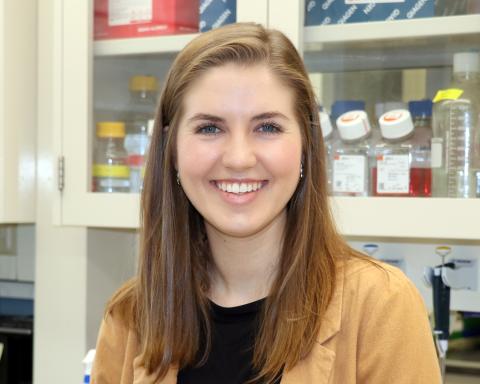Beta Cell Adaptations to Pregnancy in a Mouse Model of Gestational Diabetes Mellitus
Gestational diabetes mellitus (GDM), or elevated blood glucose levels specific to pregnancy, is the most common complication of pregnancy and can lead to future health complications in the mother and baby, such as metabolic and cardiovascular issues. About 27% of women with GDM have a pancreatic beta cell insulin secretion defect. Thus, understanding the implications of GDM, and specifically the causes of impaired insulin adaptation in this subtype of GDM is crucial to better the health of women and children worldwide.
Pregnancy is a natural state of insulin resistance. To combat this increased resistance within maternal target tissues, the pancreatic islets of Langerhans undergo structural and functional changes. Such adaptations include beta cell proliferation and a lower threshold for glucose-stimulated insulin secretion. These adaptations are largely stimulated through the prolactin receptor (Prlr) on beta cells by prolactin and placental lactogens from maternal and placental origins, respectively, yet are blunted in GDM. Why insulin secretion enhancement or beta cell compensation is blunted in GDM pregnancies has yet to be discovered.
My research aimed to pinpoint the timing of beta cell dysfunction and analyze placental and pancreatic islet transcriptomes throughout gestation, identifying genes involved in pancreatic islet adaptation in a high fat, high sugar (HFHS) induced mouse model of GDM.
We observed that the interaction of placental hormones and HFHS diet impairs maternal glucose tolerance by gestational day (d) 10.5, whereas diet exposure interrupts beta cell adaptations after d10.5, suggesting the d11- d13 window is when beta cell impairment occurs. Placental hormones allowed for more significant increases in beta cell mass and proliferation at d10.5, which confirms the necessity of these hormones for maternal beta cell adaptations to pregnancy.
Additionally, HFHS feeding reduced placental lactogen expression in early development (d7.5), which may have a delayed effect on beta cell proliferation later in pregnancy. Placental transport was disrupted at the later pregnancy timepoints in comparison to endocrine related alterations. A vast majority of gene expression differences were observed in the d17.5 HFHS pregnant islets, suggesting HFHS induced mechanisms in vivo contribute to severe islet dysfunction in late pregnancy, independent of glucose intolerance. Our results indicate HFHS feeding disrupts early endocrine function in the placenta, potentially leading to altered beta cell adaptation in late pregnancy.
This work demonstrates that beta cell adaptations in pregnancy are a result of intricate signaling networks and mechanisms that heavily rely on timing cues. It supports other data that suggest placental hormones are key regulators of beta cell adaptation and the most severe beta cell impairment in GDM is observed in late pregnancy.
Doctoral Program Committee
- Dr. Laura Schulz, Chair
- Dr. Elizabeth Bryda
- Dr. Donald Tillitt
- Dr. Trista Strauch-Safranski
Publications
Earhart AP, Karasseva NG, Storey KM, Olthoff B, Sarker MB, Laffey KG, Lange MJ, Rector RS, Schulz LC, Gil D, Neuhauser CM, & Schrum AG. 2023. Lower female survival from an opportunistic infection reveals progesterone-driven sex bias in trained immunity. Cell Rep. 42(8), 113007.
Campbell KM, Xu Y, Patel C, Rayl JM, Zomer HD, Osuru HP, Pratt M, Pramoonjago P, Timken M, Miller LM, Ralph A, Storey KM, Peng Y, Drnevich J, Lagier-Tourenne C, Wong PC, Qiao H, & Reddi PP. 2021. Loss of TDP-43 in male germ cells causes meiotic failure and impairs fertility in mice. J. Biol. Chem., 297(5), 101231.
Budd K, Sampson C, Leimgruber P, Tonkyn D, Storey KM, Garrett M, Eggert LS. 2021. Population structure and demography of Myanmar’s conflict elephants”. Glob. Ecol. Conserv., 31(1), e01828.
Van Gronigen Case G, Storey KM, Parmeley LE, Schulz LC. 2021. Effects of maternal nutrient restriction during the periconceptional period on placental development in the mouse. PLoS One, 16(1), e0244971.
Postdoctoral position: Dr. Storey accepted a postdoctoral position at the Smithsonian’s National Zoo and Conservation Biology Institute, where she will be working under the mentorship of Dr. Jennifer Nagashima.

Kathryn M. Storey
Ph.D. Candidate
Division of Biological Sciences
University of Missouri